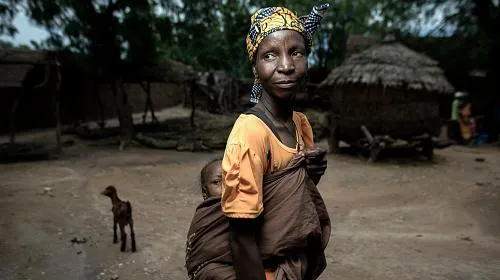GENEVA (February 21, 2019) – Today the international aid organization, CARE, launched a new report highlighting the ten most underreported humanitarian crises of 2018. Climate change plays an increasing and often exacerbating role in humanitarian crises that have been neglected by the global public, such as in Madagascar, Ethiopia and Haiti.
“Not only are the people who live in the world’s poorest countries most vulnerable to climate change, but they are also the least equipped to address its increasing impacts,” says Sven Harmeling, CARE’s Global Policy Lead on Climate Change and Resilience. “Media must not turn a blind eye to such crises and the role of climate change. Stronger media attention can also help push decision-makers everywhere to take the far-reaching actions that the climate crisis requires. Governments must step up efforts to protect and financially support those negatively affected, particularly women and girls, as well as quickly transition from fossil fuel to renewable energy.”
In most of the humanitarian crises covered by the report, such as Typhoon Mangkhut in the Philippines, which ranked 5th on the list, the effect of El Nino in Madagascar (rank 3), consecutive droughts in Ethiopia (rank 2), and various natural disasters in Haiti (rank 1), climate change plays a major role. Deteriorating environments also cause vulnerabilities that make it harder for people to be resilient to humanitarian crises in regions such as the Lake Chad Basin and Sudan. This adds to the growing body of scientific evidence that the global climate crisis undermines sustainable development and causes human suffering.
“Repetitive situations of food insecurity due to chronic drought in the south of Madagascar significantly reduce livelihoods and the ability of households to cope with the effects of climate change,” says Andriamiarinarivo Rajaonarison, CARE’s Country Director in Madagascar. “While CARE constantly monitors and works to address the situation, it is essential that this issue does not fall off the public radar. Climate change will not wait. The media must keep this issue front and center to ensure that the most vulnerable are not left behind.”
CARE calls on international media, policy makers and civil society to increase their efforts to speak about neglected humanitarian crises around the world and the ever-increasing role of climate change. Increased funding and resources invested in reporting will not only result in better coverage of neglected crises but can, most importantly, help to bring much-needed relief to those in need.
Click here to read the full report.
“Suffering In Silence” ranks the top ten crises which received the fewest media attention, meaning the least amount of online media coverage. This is the third time that CARE publishes the report “Suffering In Silence”. In 2018, the most under-reported crisis is Haiti, followed by Ethiopia and Madagascar. A year ago, in 2017, North Korea had been top of the ranking. This yearly analysis serves as a reminder and appeal to make room both in media and political debates for forgotten crises.
About CARE
Founded in 1945 with the creation of the CARE Package®, CARE is a leading humanitarian organization fighting global poverty. CARE places special focus on working alongside women and girls because, equipped with the proper resources, they have the power to lift whole families and entire communities out of poverty. That’s why women and girls are at the heart of CARE’s community-based efforts to improve education and health, create economic opportunity, respond to emergencies and confront hunger. Last year CARE worked in 93 countries and reached more than 63 million people around the world. Learn more at care.org.
Media Contacts:
Mahmoud Shabeeb, +962-79-146-39-03 mshabeeb@care.org (based in Amman, Jordan)
Nicole Harris, 404-735-0871 nharris@care.org

